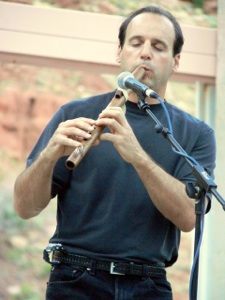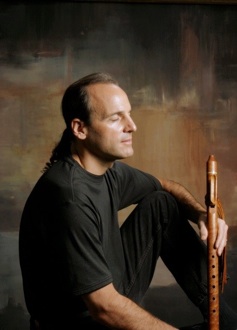I first encountered the music of Michael Brant DeMaria earlier this year when he sent me his CD, “Siyotanka,” for review. I fell in love with his haunting flute playing and was fascinated with the story that this music tells. In the process of writing the review, I read through Dr. DeMaria’s website and was amazed by the many things he is involved in. Since then, “Siyotanka” has reached the #1 position on the New Age Reporter chart, so I’m not the only one who thinks this is a great album! I think you’ll enjoy this interview with the man behind the music!
KP: After browsing your website, I would have to say that you are truly a modern-day Renaissance Man. Let’s talk about some of the things you do.
DeMaria: You’re very kind Kathy. Yes, sometimes I feel like I’m living three or four different lives. I often say I’m a psychologist by day and a musician/artist by night. However, over the years, these lives have begun to blend in some remarkable ways. I do my healing work three days each week, which leaves me four days to work on my writing, music and art. I’ve come to realize that my roles as a healer and an artist are intimately interwoven. After four days of deeply exploring my own creativity, which is a very inward process, I’m ready to be there for someone else and get outside of myself. Of course, after three days of that work, I’m REALLY ready to dive back into my own world of creativity. I have found this weaving back and forth stokes my creativity and provides a sense of balance for me.
KP: Do you use much music in your therapy? If so, do you ever use your own music?
DeMaria: Yes, I do. I’m trained as an expressive therapist so I use play, art, poetry, and music therapy in my therapy work. The main modality is music. I have singing bowls, drums, flutes, and shakers all over my office. My great joy is playing to help bring people into the present moment or to ease the tension after a particularly intense sharing or to help with visual imagery. Many clients use my recorded music to help aid in relaxation, meditation, yoga, or falling asleep. I’m one of the few musicians who is actually flattered when people tell me my music puts them to sleep!
KP: How many CDs have you released?
DeMaria: I’ve completed three CD’s. The third one, “Ocean,” will officially be released later this year. “Ocean” and “The River” are part of the “Healing Sound Series.” My most-recent release is “Siyotanka,” which you so graciously reviewed.
KP: Congratulations on “Siyotanka” earning the #1 spot on New Age Reporter’s chart for the month of February ’09! Where did the idea for “Siyotanka” come from?
DeMaria: Thank you Kathy, your words and your review of the CD REALLY mean a lot to me and certainly helped us get to #1!
“Siyotanka” began as a soundtrack and really took on a life of its own. It is a concept album that takes the listener on a mythical, magical ride through the ancient legend of how the Native American flute came into being. Composing this music about a young man’s search for his place in the world was a labor of love. The story parallels my own experience fifteen years ago when I did a vision quest during a very difficult time in my life. It was during that time that I first heard the Native American flute and the story of Siyotanka. “Siyotanka” is the Lakota word for “flute” and literally translates as “great song.” I was able to turn the ancient legend into a 90-minute play with my co-writer Stephen Lott, who is also a psychologist and artist. He painted the shield that adorns the cover of the CD. It was Stephen who suggested that I compose a soundtrack for the play and then release the CD as a concept album. I’ve been very moved by how the music has touched people around the world.
KP: Do you perform the music yourself when “Siyotanka” is staged?
DeMaria: Yes and no. I used a number of backing tracks that I played over on some pieces, but I played a good portion of the music live. It was great fun! We had people hiding in trees onstage that would change out flutes for me mid-scene. We had flutes, drums, and various other instruments - including a huge conch shell I played - hidden in strategic places all over the stage.
KP: That must have added some excitement to the performances! Have you had extensive musical training or are you mostly self-taught?
DeMaria: Mostly self-taught. I began exploring the piano as soon as I could walk. My parents love to tell the story of how I would sit engrossed for long periods of time just hitting one note at a time, fascinated by how each note would arise and then dissipate. As a psychologist, I have come to realize that what I was doing was self-soothing, which was a way of healing myself from some surgical trauma I experienced as a young child. Although I didn’t have words for it, I realized at a young age that sound could alter my consciousness and make me feel better. I think my parents might have thought I was autistic! Looking back on it, I was already playing new age music way before the genre existed!
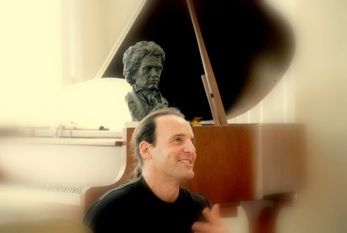
I listened to my first live jazz performance at age nine and was absolutely captivated by the drummer. I think my heart did a triple twisting back flip watching him beat out those syncopated rhythms. I went home that night and told my parents I wanted to be a drummer and spent the next ten years playing percussion in a variety of venues. During the last fifteen years, I became entranced by indigenous wind instruments (aerophones), particularly Native American flutes, and later the Australian digeridoo. Making music with the breath has transformed me and my understanding of music. These instruments have provided a deep and profound path for my own healing and spiritual growth as well. Using the breath to make music has brought me to my favorite instrument of the moment – the human voice.
KP: Which musical instruments do you play?
DeMaria: Piano, a whole range of synthesizers and keyboards, a wide range of indigenous percussion (djembe, doumbek, frame drums, shakers, rattles, etc.) and a wide range of indigenous woodwind instruments, from the Native American flute to the Australian didgeridoo. I am now working on incorporating my voice into my work.
KP: How old were you when you started writing music?
DeMaria: From the moment I touched my first key on the piano, it was like finger painting with sound for me. (I often see color and feel energy moving when I play.) When I began taking lessons a few years later, I was always getting into trouble with my piano teachers because I would spend so much time making up my own music instead of practicing my lessons. I was chastised again and again with the words “you can’t compose music until you can read music.” To my mind, that was backwards because the most natural thing for me is to discover something new every time I sit down with any instrument.
KP: I get so upset when I hear about piano teachers discouraging creativity at the piano - and there are a lot of them!
DeMaria: I feel the same way Kathy. I composed a number of pieces for friends and family growing up, but I started becoming more serious about composing in college. During my internship and residency as a psychologist, I composed five original albums (well, actually tapes) of electronic music for my close friends. It was my escape and way of staying sane through that time. However, I mark my first mature composition as being in 2003 with the release of “The River.”
KP: Do you compose often?
DeMaria: My first love was music and my natural way of playing is improvising. I’m always improvising, and it’s out of these improvisations that my compositions arise. In some ways, I’m always exploring new phrasings, rhythms and musical ideas. Many compositions disappear, never to be played again, but I’ve been trying to get better at recording whatever I improvise – a technique David Darling taught me. By the way, I’m graduating this fall from his Music for People program. It’s a four year internship in musicianship and leadership focusing on the art of improvisation. His work has had a profound impact on me and has really supported my skills as a musician and composer. I told David after my first weekend workshop with him that I had been looking for a program like his since I was six years old!
KP: That sounds like a wonderful experience! Which of the other arts are you involved in?
DeMaria: Kathy, I have learned over the years that when I create I feel more whole, healthy and happy so I try to provide as many opportunities to create as I can. My favorites (outside of music, which is my main creative passion and outlet) are writing (poetry, plays, and prose), dancing, yoga and painting. I still hope to pursue film school - a dream of mine – and one day perhaps film one of my screenplays or plays.
KP: Who and what are important musical influences for you?
DeMaria: Great question, Kathy! I would say the most enduring musical influences are the sounds of nature. I grew up in a very rural part of Connecticut, surrounded by acres and acres of woodlands. The sounds of bird songs, babbling brooks, streams, the wind, rain, and crickets were my friends. I relished the symphony of sounds there, particularly when the crickets and frogs started their nightly songs. When we moved to a suburban setting in Florida in my mid-teens, I remember missing those sounds terribly. I still say I get some of my best material from the birds! I’ve carried on a love affair with an owl who loves to play call-and-response duets with me and a particularly low flute. Some of those duets ended up on the “Siyotanka” CD in the song, “Night Watcher.” The character of the owl does not appear in the original story, but made its way into our play by way of this real-life encounter of mine.
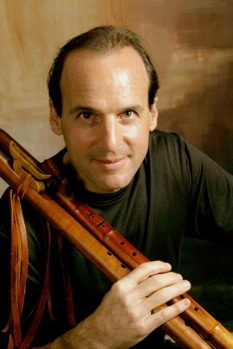
Outside of nature, I’ve always been moved by indigenous music and sacred music - particularly chanting – whether Gregorian chants, Buddhist, Hindu or Islamic sacred music. I was entranced by my father’s collection of vinyl recordings of Gregorian chants and Renaissance music, which he brought from Italy. I listened to them at night as I went to sleep. I am also a big fan of Baroque music and the French Impressionists - Claude Debussy and that renegade eccentric Eric Satie whose music I have always treasured. As an undergraduate psychology and philosophy student, I was very influenced by the ambient music pioneers like Brian Eno, Tangerine Dream, Jean-Michel Jarre, and concept albums like Pink Floyd’s “Dark Side of the Moon,” “The Wall,” and The Alan Parsons Project. I also loved anything by Will Ackerman and the Windham Hill recordings, which influenced me greatly.
When I was working on my Ph.D. in psychology at Duquesne University, I would go into the piano practice rooms at the music school (they have a great music therapy program there!) and I’d play to ease my anxiety, stress, and tension from the grueling work of exams, papers, teaching, and writing a dissertation. I would improvise for hours – sometimes for my friends. One night in the early to mid-80’s, we were all blown away by this new radio show called “Music from the Hearts of Space.” That’s where we first heard George Winston playing in a style I resonated with. It gave me a hint about what was possible and what I was naturally drawn to do, and my friends said, “that sounds like your stuff!” I was moved and inspired to keep playing.
Finally, I can say I have been stopped in my tracks three times in my life by music: when I first heard Keith Jarrett’s “Facing You,” Carlos Nakai’s “Earth Spirit,” and the solo cello music of David Darling. I have had the honor of meeting, getting to know, and playing with the last two. David Darling in particular has become a very important friend and teacher for me.
KP: Who are some of the other musicians you have performed with?
DeMaria: I’ve already mentioned that I have had the chance to perform with two of my musical heroes, Carlos Nakai and David Darling. It’s also been a thrill to perform with two-time Grammy winner Mary Youngblood, a dear friend; and Grammy winner Bill Miller, an amazing human being and musician. It was also a big thrill for me to be the featured musician for two world-renowned poets, Robert Bly and David Whyte, who have been very inspirational for me as well. I’ve also played with Mark Holland, Jeff Ball, Peter Phippen and many others. Last June, I opened for David Lanz in Zion Canyon Utah, which was a big thrill.
KP: I didn’t know that! David Lanz is one of my favorite people! Who are some of your favorite musicians?
DeMaria: I’ve already mentioned, Keith Jarrett, Carlos Nakai, David Darling, George Winston, Will Ackerman. I also love the piano music of Liz Story. In the jazz genre, I’m a huge fan of Herbie Hancock and Jean-Luc Ponty. In the rock genre, I love Jethro Tull, Pink Floyd, U-2, and Peter Gabriel. I also love ethnic music, from Ravi Shankar and Armenian dudek player Dijvian Gasparian to my favorite of the moment, Toumani Diabate, who plays the magical African Kora - his music just slays me. I would LOVE to play flute with him one day!
KP: Let’s talk about the vision quest that changed your life. First, what is a “vision quest”? When and where did yours take place?
DeMaria: In many cultures, “vision quest” refers to a rite of passage that helps people transition from one phase of life to another. This is often done to mark the transition from adolescence to adulthood, and is a way for young people to find their true callings – a ‘vision’ for their lives. Actually, if we translate the Native American word for vision quest literally, it means “the lamentation,” which in many ways is more accurate. Many of the old teaching stories talk about “crying for a vision.” I didn’t realize how accurate that phrase would be for me personally. I went on my first vision quest sixteen years ago this August. I had been working with very severe cases of child abuse and neglect for many years and was suffering from what I call “compassion fatigue.” I had just been involved with a horrendous child murder case that really broke me emotionally, and I realized I needed a break from my regular routine. Through a series of unlikely synchronicities, I found myself by a river on a reservation in Alberta, Canada, being guided by a Native elder in an ancient process called the vision quest. The word “lamentation” fit because I spent the first two days crying. My heart had been broken open from all the trauma, abuse and neglect I had witnessed. As a professional psychologist, I could not grieve at the time, and I realized it was like secondary trauma that had built up over many years. This also triggered many of my own unhealed wounds from childhood. I was always a very sensitive child and had suffered my own surgical trauma, which is one of the reasons I was drawn to work with traumatized children. The vision quest was the beginning of the deeper healing I was in need of and the beginning of my musical and spiritual journey with the flute.
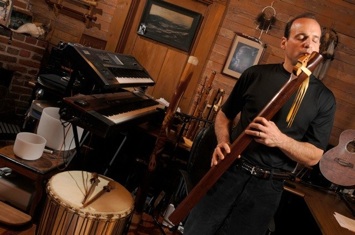
KP: And now you lead vision quests with other people?
DeMaria: I have taken a hiatus since Hurricane Ivan in 2004, but yes, after my vision quest in 1993, I began training to become a vision quest guide. I guided about fifteen quests – three a year from 1998 until 2003. It was very emotionally demanding and taxing work, but it was also some of the most powerful and gratifying work I have ever been involved in – being able to see amazing transformation in people. I sometimes saw people make changes in a week in the wilderness that might have taken five years in therapy!
Since the hurricane, I am finding myself more and more drawn to working with people with sound and music, and of course using music as my main creative outlet. That is one reason that co-writing the story and composing the music for “Siyotanka” has been so meaningful to me. Takoda, the main character in the story, finds that his place in the world is bringing the music that is in his heart to his people - to help bring more beauty, compassion and understanding into the world.
KP: Hurricane Ivan had a huge impact on your life. What happened?
DeMaria: I was recovering from knee surgery and a back injury when Hurricane Ivan hit Pensacola with a 15-20’ storm surge in the middle of the night at high tide. It was Northwest Florida’s Katrina. We live on the water, and the storm surge took our complete first floor – just wiped it out. The third floor of the house had significant damage as well. Although the main structure remained, we had two years of rebuilding to do. I downsized my clinical practice, focused more on my art and music, and began composing the music for “Ocean,” which documents my own healing journey from the storm. In a way, “Ocean” is my homage to the powerful forces of the ocean as well as my coming back to seeing this great body of water as a place of great healing that also deserves great respect. The blessing from the storm was that it forced me to downsize my practice, which allowed me to devote much more time to my music – a great, great joy. The hurricane really made me question my life. It put things in perspective and forced me to ask myself if I had died, what would I have regretted not doing in my life. I made a list and I’ve been slowly but surely working on that list. Two of the first things on that list were writing the story of Siyotanka as a play and composing the music for it. So in the end, Hurricane Ivan has been a great gift, teacher, and turning point in my life.
KP: Do you do much traveling with your work?
DeMaria: It seems I travel more each year. Each concert, workshop, or speaking engagement I do seems to spread the word of my work a bit more and leads to other connections and opportunities. To me, life is like canoeing down a river I have never been down before. It’s important for me to not try to “push” the river, but also to not “resist” the river. I try to let these events unfold naturally and organically, and just follow where the current is taking me. This “river of life” philosophy is found in my book, “Ever Flowing On” and is the theme of my first CD, “The River.”
I am hoping to tour next year with the release of “Earth,” which is the CD I’m working on right now in the studio. It will take the listener on a journey through the seven major continents of the world with a message of world peace and unity through the music.
KP: How many books have you written?
DeMaria: I’ve written two books of prose, “Ever Flowing On” and “Horns and Halos”; one book of poetry, “Moments”; a full-length screenplay, “The Breeze”; and two full-length plays, “Café Mezzo” and “Siyotanka.”
KP: Is your daughter musically or artistically inclined?
DeMaria: Daniela, who is 22 now and just graduated from college with a degree in environmental studies, is a singer/songwriter. We’ve always been very close and she made and played drums with me when she was younger. She’s played piano since she was three, but she’s really found passion playing guitar and singing. You can hear some of her original songs at
myspace.com/danielademaria. She plans to release her first album this summer, so keep an eye out! She’s also quite the artist and has written a screenplay about how her life changed after Hurricane Ivan.
KP: How did you come to call your practice “Ontos”?
DeMaria: Ontos is the Greek word for Being. Being for me refers to being whole – connecting with our essence. Ontos is a center dedicated to helping the whole person on their life journey. When we connect to our being – our innate wholeness - we discover our own truth, authenticity and healing capacity within ourselves. This is a process that awakens our genuineness, opens the heart, and helps us feel the true gift of loving and belonging to our own unique and precious lives. I could go on and on about this, but I’ll probably lose your readers. There is an extensive discussion of ‘Being’ in my book, “Ever Flowing On: On being and becoming oneself.” There is also more information on my website,
ontos.org. I will have a completely “new and improved” website coming out in the next month.
KP: Thanks for sharing, Michael!
DeMaria: Thank you Kathy!
Kathy Parsons
June 2009

